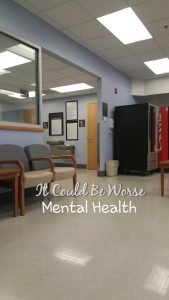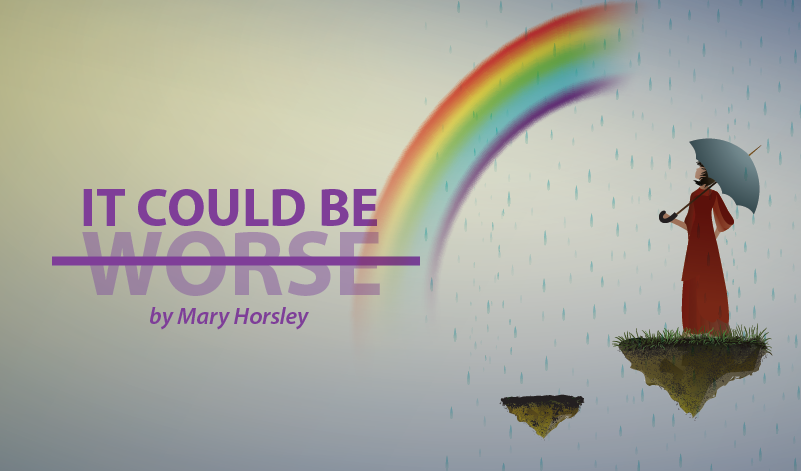Editor’s note: In this series, “Crohn’s Disease Health,” Mary Horsley writes about mental and physical health in relation to IBD, and how unreliable it can be. In the last of three columns, she focuses on the mental health nature of Crohn’s disease. Find part one here and part marytwo here.
It’s more than frustrating making and breaking plans, and it is never fun to miss out. Trust that we chronic illness warriors want to keep our plans with you. Everyone I know with a chronic illness struggles with making plans for fear of having to cancel them and let others down.

Sometimes, we can’t avoid it. Sometimes, we have to give in and listen to our bodies, because no one knows it better than we do.
Beyond the belly and bathroom, Crohn’s disease and IBD can affect your entire body, inside and out. The physical problems patients suffer often happen without warning and they can easily change your plans immediately. See my “Beyond the Bathroom” series and my “Crohn’s Complications” series.
Along with each physical problem, IBD not only takes a toll on your body, but also it takes a toll on your mental health.
From not being able to do things or participate with friends to being invited to events and spending that time worrying, IBD can affect mental health as much as physical health.
After a new IBD diagnosis, or even years into a treatment, struggling with your own physical health and living with an unpredictable chronic illness can affect mental health.
Stress, anxiety, depression, PTSD, hypervigilance, cognition response decline: Each can come because of IBD and each patient’s personal struggle with it.
With each invasive procedure and each “accident,” the mental health aspect of IBD is tested. With each medication change and flare up, these multi-systemic diseases affect more than just the digestive system, but the mental, social and psychological well-being of patients.

With IBD, a state of hypervigilance can become the norm, as you not only notice things more readily about your symptoms and body, but also you’ll likely to be unable to take your attention from it.
And while hypervigilance can be seen as normal in certain situations, it’s not healthy for the body or mind to spend too long in a hypervigilant state of worry, putting many patients at risk for PTSD.
IBD and the effects on patient mental health can disrupt sleep, or cause a lack of it. IBD can lead to and cause avoidance behaviors, health unreliability and it can make you antsy as well as anxious. Being on high alert and worrying all the time can be more than exhausting.

This disease can make you irritable or prone to outbursts, feelings of guilt or blame at times, it can make you spend your time alone and it shelters you from those who just don’t understand, let alone how traumatized one can get in this life-long process.
Panic attacks are definitely possible and reliving the embarrassing moments can lead to fears for the future.
I also happen to suffer on the inside with anxiety, depression and my own mental health. My diagnosis had placed me in a negative state for a long time, something I still struggle with today on my bad days. I was depressed about things I could not change, so much so that I began seeing a therapist to help my mental health and I began sharing my journey through my own personal blog.

I and other Crohn’s and colitis warriors are on constant alert with fear and anxiety for our bowels and our bodies. I still get scared for accidents and anxious for finding the right medications. I will be forever worrying about another abscess or painful surgery, worried for inflammation or worried about waking up again during a scope. My emotional well-being has easily been through just as much as my physical health with my own Crohn’s diagnosis.
I cannot offer medical advice, I can only share what I know from my personal experiences. Remember, my Crohn’s disease is individual for me, and what works for me may not necessarily work for you.
For me, It Could Be Worse. (Cover photo credit goes to my friend and photographer Tim Goins)
***
Note: IBD News Today is strictly a news and information website about the disease. It does not provide medical advice, diagnosis, or treatment. This content is not intended to be a substitute for professional medical advice, diagnosis, or treatment. Always seek the advice of your physician or another qualified health provider with any questions you may have regarding a medical condition. Never disregard professional medical advice or delay in seeking it because of something you have read on this website. The opinions expressed in this column are not those of IBD News Today, or its parent company, BioNews Services, and are intended to spark discussion about issues pertaining to IBD.



Hi, it broke my heart seeing that pic of you upset. I have Crohn’s disease and I felt your pain when I looked at you. What a brilliant thing your doing sharing your journey. Keep up the great work your doing. Everything happens for a reason I believe and so maybe part of your journey it to help others with there’s. God bless you and I hope along with all other IBD sufferers that one day they do find a cure xx
I am thankful that my sharing can help others, even just a little. I know finding information, real information beyond the scientific paperwork, can be difficult to find. I hope you have found some relief, and YES! Let’s hope for a cure sooner than later! Thank you for reading and reaching out, it means so much.
Thank you so much for sharing your experiences I definitely relate to a lot of what you are going through. Too many times I feel alone and misunderstood with Crohn’s and that’s even by doctors when I have to go to the ER. I have such anxiety when I am in pain I fight and fight till I can’t anymore to not have to go to the ER because I feel I put too much stress on my husband, kids and rest of the family even though they say I don’t and just worry about getting better I can’t because I see the scared looks of my children and stress in my families eyes every time I go in and it kills me to see it every time and can’t help but feel a lot that it’s my fault they have the stress in their lives. I feel like I take away from my daughters childhood a little because they are always worried if mommy is ok and always asking how I’m feeling. They shouldn’t have to stress over mommy if I am going to be ok or not that is what I am suppose to do for them and I just feel it’s not fair. My mother has Crohn’s also and I know what my kids are worried about and feeling every time I get sick because I did with my mom when I was a child and I still worry about her till this day probably more than I worry about myself. My mother is the strongest person I know and Crohn’s had dealt her a lot of hard times and she gets through them even when we think she isn’t going to. My wish for me is I can be half as strong as my mother because she is definitely my hero and I love her so very much.
Thank you so much for reading and reaching out. I am sorry to hear that you can relate and that you and family members have Crohn’s disease. I wish it on no one I too have felt alone and misunderstood when I go to the ER, they look at you as if you’re a leper or a drug seeker, and when your labs and everything come back normal they are quick to judge and not understand that our battle is on the inside. You are strong and you have a lot to deal with. Hugs to you my fellow Warrior!
I’m 28 years old and I have had Crohn’s for 6 years. I’ve been incredibly blessed that my disease is very mild, and I’ve had little to no symptoms for the last 5 years.
But the anxiety and depression is absolutely killing me. I’ve struggled with it every single day since I started having the first symptoms of Crohn’s. I often go to bed and pray that I could have one day where I could switch, and have severe physical symptoms of Crohn’s, but no mental illness. Maybe that sounds awful, but I’d do anything for just a day’s break from the rumination, the worry, the panic, and the hyper-vigilance.
I absolutely broke down into tears when I saw the 2 pictures of you having a bad day. It just hit me so hard because I’ve been there countless times; I know that face, I know that feeling.
I’m amazed at your courage to talk so openly about not only your journey with Crohn’s, but with mental health as well. It really is inspirational to me! I only “went public” about my Crohn’s diagnosis last year (only about 3 people knew prior), and while it was difficult, it’s been one of the best things I’ve ever done.
I would love one day to be so open about my battle with anxiety and depression, but it’s so much harder when it comes to mental illness. There’s a stigma, people don’t know how to react, when in reality it should be no more embarrassing than breaking your arm.
Keep up the amazing work with your articles, I love them so much!
Hello anonymous, I am so sorry to see that you can understand my pain. Too often people think Crohn’s is just a bathroom disease, but it is so much more than that. It really does take its toll on our bodies and our minds. I am so sorry that my photos hit you hard, those were truly bad days for me and days that I just couldn’t deal. Sometimes we have to have a breakdown, we can’t hold it in forever. I absolutely hope one day you can share your journey, I am always available to talk if you’d like to chat. You can always find me on Facebook or other social medias if you’d rather talk privately. Thank you so so so much for reading. It does mean a lot to me!!
Mary…thank you for sharing this. I was diagnosed with Crohn’s at age 15. The anxiety, depression, PTSD, fatigue are all things I’ve struggled with. I feel less alone when coming across stories like yours. It’s hard to put into words what this disease can do to a person. I know it has taken quite a toll on me but I try to stay positive and reading stories like yours helps so thank you for that .
.
Thank you! I hope you find relief! I’m here if you ever need to vent!
I am a retired police detective. For 29 of my 32 year career I worked a second full time job with another one day a week, 10 hour job, so without any off duty court time, I worked a minimum of 90 hours a week.
Poor eating habits, much too much coffee and I smoked (a lot). I began having lower abdominal pain and after seeing several different physicians was finally referred to a gastroenterologist.
He determined I was suffering from Inflammatory Bowel Disease. He demanded I cease smoking, reduce the coffee intake drastically, eat much more healthy and reduce my work load. He prescribed several medications.
I did find some relief, by kept having reoccurring flare ups.
I was teaching an Accident Investigation Class at a local University and one of the students was a reserve police officer, who was also a physician.
During a lunch time conversation I mentioned I was having a I.B.D. flare up. He asked if I had ever tried slippery elm bark powder. He told me it has been found to be very helpful for I.B.D.and was a old Native American cure-all. He also told me to use the very fine powder like a tea, adding boiling water to a tablespoon of the powder, allowing it to dissolve and drinking it three times a day, desirably 30 minutes after a meal.
I tried it thinking this will never help and to my surprise IT WORKED WELL. At the first indication of a flare up, I would begin the tea regiment and within a day, two at the most all the pain was gone. Shortly after several flare ups I found that Slippery Elm Bark Powder is available in capsule form and tried these and it also helped immensely and it is much easier than drinking the thick mucilage tea.
I can only say try it, it worked for me and has continued working for the 35 years I have used it.